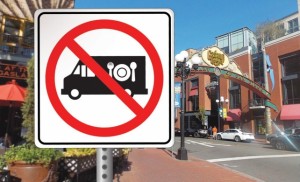SAN DIEGO, CA – Where San Diegans can buy a lobster-grilled-cheese sandwich or a chipotle-eggplant taco from a truck has been the subject of much talk during the last few months. Food-truck operators, neighborhood associations, city bureaucrats and elected officials have hotly debated how to regulate a mobile-food-vending industry that’s evolved in recent years to provide much more than bean burritos.
Facing pressure from so-called gourmet-food-truck operators, the city recently acknowledged that, under the state’s vehicle code, it can regulate mobile food vendors only in the interest of public safety. As a result, proposed regulations no longer include a rule that would have banned food trucks from operating within 75 feet of a street-level restaurant without permission from the owner.
This decision, stemming from an opinion from the City Attorney’s office and months of public meetings, significantly frustrated at least one city leader.
“So, just to make it clear, we’re not allowed to do economic protectionism, even though that’s protecting the restaurants that we have?” City Councilmember Lorie Zapf asked a deputy city attorney at the Feb. 12 meeting of the council’s Smart Growth and Land Use Committee, which she chairs.
“If someone just comes and parks right next to them at the lunch hour and, you know, kind of takes a lot of their business, we’re not allowed to protect the restaurant legally is what I’m hearing,” she added.
The 75-foot ban would be difficult to justify in terms of public safety, but the City Attorney’s office is “happy to analyze it,” responded Deputy City Attorney Inga Lintvedt. “There’s case law that ties the city’s hands there, but the city is always free if it can make public-health-and-safety findings and tie it that way.”
How the city justifies its proposed regulations has become the central issue in the debate over where food trucks can operate.
During the past decade, many cities, notably Los Angeles, San Francisco, Portland and Austin, have grappled with how to regulate the emerging industry of gourmet food trucks. While San Diego has hashed out its position, local food-truck operators have dealt in the last year with vague city rules, selective enforcement and restaurant owners increasingly concerned about competition.
Gourmet-food-truck owners in San Diego and elsewhere have long complained that regulations often unfairly limit competition and, in some cases, have won significant legal battles. In response to concerns, interim Mayor Todd Gloria recently assured mobile food vendors that the city’s only intention with its draft regulations is to promote public safety.
“I’ve heard that the proposed ordinance is somehow anti-competitive, or discriminatory and enforces rules on food trucks that do not apply to other businesses in adjacent areas,” he said at a Feb. 13 press conference. “I’d like to correct that. The intent of the ordinance is a fair approach to protect public health, safety and welfare.”
Find the entire article at aaa <here>




